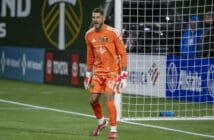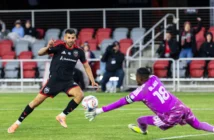Following several weeks of rumour and speculation, on Friday Ben White’s transfer from Brighton & Hove Albion to Arsenal was confirmed for a fee believed to be in the region of £50million.
The move to the Emirates Stadium continues a rapid rise through the football pyramid that began with a loan spell at League Two Newport County in the 2017/18 season, and his first two appearances for England in the warm-up games ahead of Euro 2020 showed that Mikel Arteta’s side are getting a defender that not only has great potential but will be capable of improving them immediately.
Having been named in the Championship PFA Team of the Year as he helped Marcelo Bielsa’s exhilarating Leeds United return to the Premier League in 2020, White’s maiden season in the top flight was nothing short of exceptional.
The Poole-born centre-back played 36 times for the Seagulls in the 2020/21 Premier League season. He excelled in his natural position on the right of a back three for Graham Potter’s side but also showed a great deal of versatility by filling in both in midfield and as a right wing-back following Tariq Lamptey’s injury struggles.
White was voted Brighton’s Player of the Season, and statistically he stood out as one of the league’s most talented defenders. According to FBref, he ended the season in the 82nd percentile among Premier League centre-backs for defensive pressures, whilst also in the 73rd percentile for blocks.
The skillset he showcased in a possession-heavy Brighton side – of teams that finished in the bottom half of the Premier League, only Southampton averaged a greater share of the ball in the 2020/21 season – should be transferable to an Arsenal outfit that will likely be on the front foot in the majority of their games as they seek to re-gain qualification for European football.
White’s numbers in terms of his ability on the ball are even more impressive than his crude defensive statistics. He finished his first full season for Potter’s side in the 93rd percentile of Premier League centre-backs in terms of dribbles completed.
His departure will surely be a significant blow for Brighton. A side with the joint-seventh best defensive record in the Premier League last season losing one of it’s most promising components should in theory lead to issues considering the vague threat of relegation lingered until the final weeks of the campaign.
However, they are receiving a record transfer fee for an individual who some would argue is not even their best centre-back.
Lewis Dunk was impressive in Brighton’s first two seasons in the Premier League but the arrival of Potter as head coach has seen his game develop even further. Dunk has combined the resolute defensive skills that heroic centre-backs are made of with an ever-improving passing game and an ability to marshal a defensive line that can vary in terms of its position on the pitch from game to game depending on the opponent.
His head coach suggested to SussexLive that Dunk had been “sensational all season” following a 2-0 win over Leeds in May, and while Potter would not be drawn on whether or not it was the type of performance that should see his captain add to his solitary England cap, the 29-year-old could justifiably argue that he had a stronger campaign in the 2020/21 season than several of the defenders Gareth Southgate selected for Euro 2020.
It was of course White who was a part of the Three Lions’ journey to the final, called up as a late addition to the squad once Trent Alexander-Arnold was ruled out of the tournament through injury, but taking that as a straightforward indicator of him being the superior player would be overly simplistic.
Even a direct comparison between the two defenders is slightly unfair. They were used in different ways last season, Dunk leads the backline from the middle of the defence while White was regularly encouraged to drive forward from his position on the right of the three, and this is reflected in their stats.
White outperformed his former skipper in terms of pressures, blocks and tackles, however Dunk dwarfed his recently-departed team-mate in relation to his passing statistics, reflecting his role in the backline as something of a ‘libero’.
White is also six years younger than Dunk, highlighting once again that Arsenal are paying for potential and hoping for longevity as much as they are acquiring an immediate upgrade to their defensive options.
It is possible to make a more accurate comparison between White and Adam Webster as they effectively mirror the roles of one another either side of Dunk in a back three. The third member of Brighton’s regular backline from last season, Webster improved once again in what was only his second season of Premier League football.
Webster comes out on top in terms of progressive passes, progressive carries, and is particularly dominant compared to White in terms of aerial duels, although Arsenal’s new arrival recorded better statistics in terms of blocks, defensive pressures and dribbles, just as he does when compared with Dunk.
None of the three have appeared in pre-season as of yet for the Seagulls. Dunk and Webster are both missing through injury and White was given extra time off due to his involvement in England’s Euros squad, meaning the other defensive options the Seagulls possess have been given an opportunity to stake their claim for the new vacancy in the back three.
Following Saturday’s 3-1 pre-season win at Luton Town, Potter suggested that he feels the solution to the conundrum created by White’s departure lies in-house.
Speaking in an interview on Brighton’s website he said: “We have got enough competition in the centre-back area, we have enough good players and can be flexible with how we set up,”
Despite being used as wing-backs for much of last season, Dan Burn and Joel Veltman are both naturally central defenders, meaning they would be unlikely to struggle should Potter decide to field them there, and 21-year-old Norwegian defender Leo Ostigard is now back at the club following an impressive loan spell with Coventry in the Championship. Shane Duffy has also returned to the squad this summer after a season at Celtic.
Next weekend’s final pre-season fixture against Getafe might well determine how much faith the Brighton boss has in these potential replacements, and with a month still to go in the transfer window, it may be no surprise to see Brighton eventually decide they need an external successor for White.
They have a strong track record of replacing players that have left the club in recent seasons, and given the size of the incoming transfer fee it is unlikely that they will be short of potential candidates.
The signing of midfielder Enock Mwepu from Red Bull Salzburg this summer has calmed fears of one of the Premier League’s big spenders coming in for Yves Bissouma, and although White is arguably the first player Potter has seen depart that he did not want to lose during his time at the Amex, he has shown ample ability to help the team adapt to previously important players moving on.
Stalwarts of Chris Hughton’s Brighton side have been replaced and even improved upon by Potter and the Brighton recruitment team. Duffy, Anthony Knockaert and Glenn Murray were all significant parts of the Seagulls’ side that won promotion to the top flight in 2017, yet none of them have been particularly influential players for the current head coach as he continues to adapt the Seagulls’ style of play.
Therefore replacing one talented centre-back who is accustomed to the demands of the system with another from the abundance of defenders in the Brighton squad, or by delving into the transfer market to spend some of the hefty fee received from Arsenal, should be fairly straightforward by comparison.
One of the less obvious candidates to be White’s successor is 19-year-old academy product Haydon Roberts. There is now a clearer pathway to the first team for a defender who spent last season on loan at Rochdale, however the fact that he is left-footed would mean a re-jig of Potter’s backline may be required, and with Roberts having played only a solitary season of regular football another loan move may be more appropriate.
Potter showed during his time at Swansea that he had no aversion to trusting in youth though. He gave current Tottenham Hotspur and Wales centre-back Joe Rodon his debut for the South Wales club and retained faith in him through both good and bad performances before Rodon suffered a metatarsal injury mid-way through Potter’s solitary season at the Liberty Stadium.
Another trait Potter displayed at Swansea, and has during his time at the Amex so far, has been an impressive level of tactical flexibility.
In his first year at Brighton, he regularly switched between systems that utilised a back three and ones that incorporated a back four. Although a three was used more regularly last season – mainly thanks to the return of White from his spell at Elland Road – the former Ostersund boss undoubtedly has the tactical range, and tools at his disposal, to make a back four workable.
Both Dunk and Webster have plenty of experience playing in a centre-back pairing. The signing of Mwepu could see the Seagulls field a midfield three instead of the Bissouma-Adam Lallana double-pivot that was used last season, and Polish left-back Michal Karbownik’s arrival at the club in January increases the number of natural full-backs in the squad.
The options in this current Brighton squad should mean that adapting to White’s departure is seen as something of an interesting opportunity rather than a devastating blow.
He will undeniably be a loss for Brighton. Seagulls’ supporters will be all the more disappointed to lose such a talented graduate of their academy having seen him play just a solitary season on the south coast, although they will likely begrudgingly accept that this is another example of football’s financial food-chain in full swing.
Both the numbers and anyone who has kept a close eye on White’s rapid progress will tell you that Brighton are losing one of the most promising young central defenders in European football. However, their track record of replacing talented individuals, combined with their head coach’s capacity to be adaptable, should mean that it is a transfer that ultimately benefits all parties involved.
Follow us on Twitter @ProstInt
Apologies, but no results were found for the requested archive. Perhaps searching will help find a related post.EPL
Brighton and Hove Albion
Nothing Found
![Prost International [PINT]](https://prostinternational.com/wp-content/uploads/2021/08/PINTtFontLogoRoboto1536x78.jpg)


